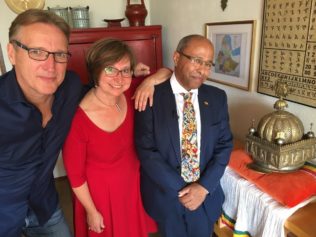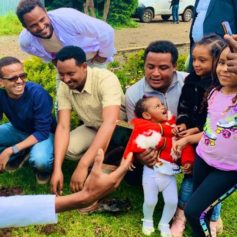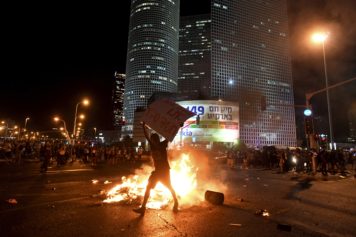For some, the emergence of Ethiopia as Africa’s third-largest economy is cause for celebration. The ancient nation skirting the continent’s horn recently surpassed its southern neighbor Kenya as the largest economy in East Africa with a projected Gross Domestic Product (GDP) of $78 billion. The first country to open an electric cross-border railway line in Africa, Ethiopia’s rapid economic expansion is due to major innovations in industry, irrigation and energy alongside its successful attraction of foreign investment. In 2015, Prime Minister Hailemariam Desalegn was named “Man of the Year” by Africa World News for sustaining the country’s substantial economic growth.
But for many Ethiopians, there is little to celebrate. The country remains desperately poor with the World Bank reporting Ethiopia’s per-capita income to be $619, well lower than the regional average. With food aid expected to run out next month, the United Nations estimates close to eight million Ethiopians are in danger of starvation. Human trafficking continues to be a major problem for the country’s poverty-stricken migrants. And human rights abuses have been rampant given ongoing land grabs by the Desalegn regime and its violent crackdown on associated protests, press and media freedoms.
Accordingly, some believe Ethiopia’s recent economic growth was not forged for its masses of struggling citizens but upon their backs.
“In the name of modernization, people have been forcibly removed from their land to clear those lands for sugarcane and cotton plantations,” says Anuradha Mittal, founder and executive director of the Oakland Institute, an independent think tank for international policy matters. The California-based institute’s recent report on Ethiopia notes its government’s plan to become one of the world’s largest sugar producers and exporters by 2023. Because of the associated displacement, explains Mittal, you had “widespread protests last year that led to more than 36,000 people being arrested. So, you have every political opposition leader behind bars, you have no freedom of press, you have people being arrested for challenging the government’s plan to take over their land with no compensation” while the country’s “newspaper editors and indigenous leaders have all been locked up” and charged as “terrorists.”
For the past eight years, the institute has shed light on how Ethiopia’s economic expansion has masked human rights abuses and how its government has displaced millions of small farmers while moving forward with plans to earmark over 15 million hectares of land for large-scale agricultural investors. It has further exposed the torture, oppression and silencing of those who have attempted to resist forced removal in indigenous and pastoralist communities within the Afar, Oromia and Amhara regions.
“Last year, we brought in a team of lawyers from very respectable law firms in Europe and the United States,” says Mittal, noting they reviewed how the Ethiopian government employed its ‘terrorism’ designation. “It was obvious that it does not meet any international standards and is a misuse of law to basically cause the complete elimination of human rights in the country.”
Some see things differently. In December 2015, upon a deadly crackdown on protests triggered by a scheme to expand administrative control in the Oromia region — and six months after the ruling party won a highly questionable 100 percent of the seats in the Ethiopian parliament — the government accused protesters of links with terror groups without any significant evidence. “Destructive forces are masterminding the violence from the front and from behind,” offered Desalegn on state television, adding the authorities “will take merciless legitimate action against any force bent on destabilizing the area.”
Such inflammatory rhetoric continues to accompany the Desalegn regime’s relentless economic agenda. Legitimate or not, part of the reason why a country like Ethiopia can ‘succeed’ economically while its citizens do not lies in the ongoing use of gross domestic product as the primary measure of a country’s economic performance. GDP is the total monetary value of all the finished goods and services produced within a country in a year. As such, it does little to account for the health and well-being of citizens since a nation’s elite class, which commonly controls major industry, can substantially increase profits and raise GDP without any significant change in the plight of the masses. Because of this, the Social Progress Index (SPI) is considered a more effective measure of national well-being as it accounts for such basic human needs and indicators as water, nutrition, sanitation, shelter, safety, access to information, personal rights, freedom, environmental quality, education, opportunity, tolerance and inclusion. When compared to countries with similar economies, Ethiopia performs poorly in a number of key SPI categories including access to water, nourishment, education, information and basic freedoms of expression and movement.
Despite these poor indicators, strategic investment allies like the U.S. can still point to GDP, positive economic growth and counterterrorism efforts as an ironic justification for its alignment with such repressive regimes. A bill promoting democracy and human rights accountability in Ethiopia has sat before the U.S. Congress for over a decade.
“The unfortunate reality is the United States has chosen to turn a blind eye to these widespread human rights abuses despite the evidence Congress has seen,” says Mittal, lamenting how America continues to “provide aid for very problematic programs which lead to the displacement of people. But also, because Ethiopia is an ally in the ‘War on Terrorism,’ the United States has not pushed for democracy.”
Still, Mittal believes change in Ethiopia can happen. “It is very important that its international allies here in the United States and the World Bank start putting pressure on the country to allow basic freedoms,” she says, citing an urgent need for independent media and fair elections.
Mittal takes it one step further. “I think we have to question the whole development paradigm.” Displacement of communities and the destruction of land, homes and families, she continues, should not be regarded as “development. It is important that international institutions such as the World Bank stop promoting very harmful development strategies which deliberately profit a few corporations” while a nation’s people are “starving.”
“So, I think we have to challenge the whole development model itself.”


